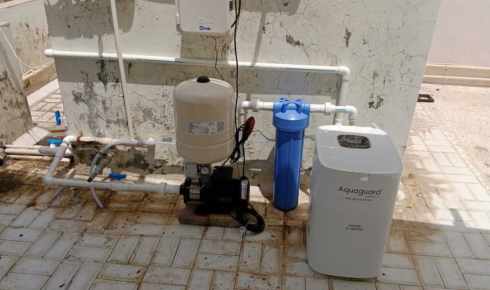There’s something grounding about living outside the city — waking up to open skies, breathing cleaner air, maybe even drawing your own water from a well. But that simple, rural lifestyle comes with one tricky reality: your water isn’t always as pure as it looks. Hard minerals, iron, or bacteria can quietly creep in, leaving stains on sinks, scaling in pipes, or strange tastes in your morning coffee.
It’s not something you notice right away — until it becomes impossible to ignore.
That’s usually when people start searching for a water softener near me, realizing they need more than just a filter. They need a real solution, one that understands the unique challenges of rural water.
When “Natural” Isn’t Always “Clean”
There’s a common assumption that rural water — drawn straight from the ground — is somehow cleaner or purer than what flows from city taps. But that’s not always true. Groundwater picks up everything in its path: calcium, magnesium, iron, and sometimes even traces of agricultural chemicals.
Unlike municipal water systems, where large-scale filtration and chlorination are standard, rural homes are on their own. That means homeowners have to be the water treatment department, maintenance crew, and quality assurance team — all rolled into one.
It’s not about fearmongering. It’s just reality. Your well water might taste earthy and pleasant today, but if your fixtures start staining orange or your soap refuses to lather, it’s time to take a closer look at what’s flowing through those pipes.
The Everyday Impact of Hard Water
Hard water might not sound like a big deal at first — until you live with it. The buildup it leaves behind sneaks into everything: faucets, showerheads, dishwashers, even your hair. Over time, it’s like living with invisible sandpaper slowly wearing things down.
Your skin feels dry, your laundry turns stiff, your appliances start losing efficiency, and your energy bills inch upward because heaters and washers are fighting against mineral deposits.
The good news? You don’t have to replace your plumbing or move back to the city. You just need the right system in place — something designed for homes that rely on private wells and variable groundwater quality.
Enter: Rural Water Treatment Systems
This is where rural water treatment systems come in. These aren’t cookie-cutter filters you grab from a hardware store. They’re customized setups built for the specific water challenges in rural areas — whether that means removing high levels of iron, balancing pH, softening minerals, or disinfecting bacteria.
Each system starts with testing. Before anything else, you need to know what’s actually in your water. Is it just hard minerals? Or are there deeper issues like nitrates or sulfur causing that “rotten egg” smell?
Once you know, treatment can be tailored — a water softener for hardness, a carbon filter for taste, UV sterilization for bacteria, or a reverse osmosis unit for drinking water. It’s not just about fixing one problem; it’s about creating balance across your entire household.
Why Local Expertise Matters
Water quality isn’t universal — it’s local. The minerals in Saskatchewan are different from those in Manitoba or Alberta. That’s why working with local experts matters so much. They understand the geological quirks, the seasonal changes, and even how weather patterns affect well water chemistry.
A good local dealer won’t just sell you a unit and disappear. They’ll test, recommend, install, and maintain your system so you’re not guessing. If something goes wrong, they’re a phone call away — not a faceless customer service line.
That’s the difference between a short-term fix and a lifelong solution.
Protecting More Than Just Your Water
Clean water isn’t just about taste or convenience. It’s about protecting your investment — your home, your appliances, your health. Every gallon that passes through untreated can leave microscopic damage behind.
Take your water heater, for instance. Hard water shortens its lifespan dramatically by coating heating elements with scale. The same goes for dishwashers, washing machines, and plumbing lines. Over the years, untreated water costs far more in repairs and replacements than a treatment system ever will.
And it’s not just about money — it’s about comfort. Once you’ve lived with truly soft, clean water, you’ll notice the difference immediately. Softer skin. Shinier dishes. Laundry that feels new again. Even your morning coffee somehow tastes better.
What About Rural Communities and Farms?
Rural living isn’t limited to single-family homes. Farms, workshops, and small rural businesses also depend heavily on reliable water. From irrigation systems to livestock care, water quality affects everything.
Poor water can lead to reduced crop yields, livestock health issues, or even compliance problems with agricultural standards. That’s why large-scale rural water systems are essential — not just for comfort, but for productivity and sustainability.
These systems often integrate multiple technologies: filtration for sediments, softening for minerals, and chemical removal to protect both crops and machinery. For farmers, that can mean healthier animals, longer-lasting equipment, and fewer headaches with maintenance.
When you zoom out, the ripple effect is clear — better water means stronger rural communities.
The Hidden Challenge: Changing Water
Here’s something people don’t always realize: groundwater doesn’t stay consistent. It changes with the seasons, rainfall, and even nearby land use. What tests fine in spring could shift by fall.
That’s why long-term maintenance is just as important as installation. Filters need replacement, membranes need cleaning, and systems should be checked annually. It’s not a “set it and forget it” situation — it’s more like regular car maintenance.
Neglect it, and small issues can creep in. Stay on top of it, and your system will reward you with years of flawless water.
Finding the Right Partner
When you start searching for local solutions, you’ll find plenty of options. But not all are created equal. Look for providers who understand rural needs specifically — those who don’t just sell systems but educate you about how they work.
It’s also smart to choose companies that offer water testing first, not just generic equipment. Every well, every property, every aquifer has its own fingerprint. A good dealer knows how to read it.
And if you ever find yourself searching online for “water softener near me,” pay attention to reviews and local referrals. Real-world experiences speak louder than technical specs.
Why It’s Worth It
It’s easy to postpone investing in water treatment. After all, it’s invisible — until it isn’t. But once you make the leap, the change is impossible to ignore. Showers feel luxurious. Dishes sparkle. Clothes come out of the wash softer. Your appliances thank you quietly by lasting years longer.
You’ll also have peace of mind — something that’s hard to put a price on. No guessing, no wondering what’s in your water, no worrying when guests ask for a glass.
A Thought to Close On
Living rural isn’t about sacrificing comfort — it’s about finding smart ways to make that lifestyle sustainable. Clean water isn’t a luxury; it’s the foundation of everything else.

